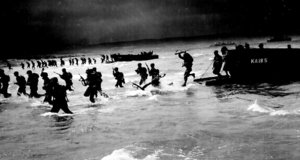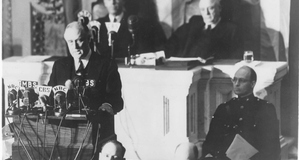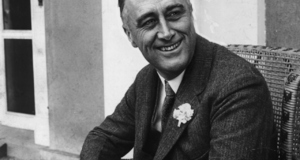|
Roosevelt's Imperialism: The Venezuelan Crisis, the Panama Canal, and the Origins of the Roosevelt Corollary
Roosevelt did not refute his earlier claim that it was within the right of a great power to intervene in the sovereignty of another nation in order to redress economic or commercial grievances, as evidenced when he declared in 1905 that “this country would certainly decline to go to war to prevent a foreign government from collecting a just debt.” Rather, he shifted his argument by declaring his opposition to even temporary European intervention in the western hemisphere not because intervention itself was morally wrong, but because “such temporary occupation might turn into permanent occupation.” Therefore, in order to avoid creating a legitimate pretext for European intervention, the United States must act pre-emptily to ensure its fellow American republics “keep order and pay its obligations.” America would enforce “sound economic principles” on Latin American nations, and as a measure of last resort would be justified in intervening military to ensure compliance of financial or treaty obligations with the United States or another European power. The United States, through an activist military policy in the western hemisphere, would act as Europe’s policeman within its declared sphere of influence.
The emergence of a formal and informal American Empire in the western hemisphere was one of the seminal events of the early 20th century. The Roosevelt Corollary, as outlined in Theodore Roosevelt’s State of the Union addresses in 1904 and 1905, is significant in this sense as it provided a rationale, and more importantly a justification, for American imperialism in Latin and South America. Though framed as an amendment to the Monroe Doctrine, the Roosevelt Corollary outlined a new vision for America’s foreign policy; rather than acting as a republican bulwark against European imperialism, the United States would appropriate the role of an imperial power itself in lieu of the European great powers.
Yet, Roosevelt’s doctrine for American imperialism emerged slowly and in response to real or perceived threats to the United States strategic interests. The first, the Venezuelan Crisis of 1902-03, was significant in that it highlighted the threat posed to American hegemony in Latin America by even limited European intervention, in that such actions could ultimately result in the securing of a permanent colonial foothold. These fears were most evidently directed against Germany, who was perceived by Roosevelt to have the means and the ambition to establish a colonial empire in the America’s. The crisis was also significant in that it marked the moment when Europe effectively acknowledged the supremacy of the Monroe Doctrine as well as the moment that the United States could effectively enforce it.
The second event was the acquisition of the Canal Zone in Panama for the purposes of building a canal across its isthmus. This provided the actual catalyst for the formulation of the Roosevelt Corollary, as the canal became both a major strategic asset and liability which the United States had to defend. Isolated from the United States, the canal could only be defended by the navy, and this in turn rested on the assumption that foreign navies would not have access to naval bases in the Caribbean. To prevent imperialist intervention whereby foreign powers might acquire such bases, as seemed likely during the Venezuelan Crisis, the United States would assume the responsibility of policing the western hemisphere and restoring order to wayward states. Thus, Roosevelt hoped to eliminate any pretext for European intervention by transferring these responsibilities to the United States. In this way, he hoped to legitimize American imperial interventions and, by extension, the existence of America’s formal and informal empire in the region.
Forbes, Ian L.D. 1978, “The German Participation in the Allied Coercion of Venezuela 1902–1903,” Australian Journal of Politics & History, Volume 24, (3): 317–331.
Kaplan, Edward S. 1998. U.S. Imperialism in Latin America: Bryan's Challenges and Contributions, 1900-1920. Westport, Conn: Greenwood Press.
Kennedy, Paul. 1987. The Rise and Fall of the Great Powers: Economic Change and Military Conflict from 1500 to 2000. New York: Random House.
Livermore, Seward W. 1946, “Theodore Roosevelt, the American Navy, and the Venezuelan Crisis of 1902–1903,” The American Historical Review, Volume 51 (3): 452–471.
Maurer, Noel, and Carlos Yu. 2011. The Big Ditch: How America Took, Built, Ran, and Ultimately Gave Away the Panama Canal. Princeton: Princeton University Press.
Maass, Matthias. 2009, “Catalyst for the Roosevelt Corollary: Arbitrating the 1902–1903 Venezuela Crisis and Its Impact on the Development of the Roosevelt Corollary to the Monroe Doctrine,” Diplomacy & Statecraft, Volume 20 (3): 383 – 402.
Mitchell, Nancy. 1996, “The Height of the German Challenge: The Venezuela Blockade, 1902-03,” Diplomatic History. 20 (2): 185-210.
Morris, Edmund. 2002, “‘A matter of extreme urgency’: Theodore Roosevelt, Wilhelm II, and the Venezuela Crisis of 1902,” Naval War College Review. Volume 55 (2): 73-85.
Ricard, Serge. 2012. A Companion to Theodore Roosevelt. Chichester, West Sussex: Wiley-Blackwell.
Ricard, Serge. 2006. “The Roosevelt Corollary,” Presidential Studies Quarterly. Volume 36 (1): 17-26.
Theodore Roosevelt State of the Union Addresses: Accessed from the Almanac of Theodore Roosevelt Website.
1901: http://www.theodore-roosevelt.com/images/research/speeches/sotu1.pdf
1903: http://www.theodore-roosevelt.com/images/research/speeches/sotu3.pdf
1904: http://www.theodore-roosevelt.com/images/research/speeches/sotu4.pdf
1905: http://www.theodore-roosevelt.com/images/research/speeches/sotu5.pdf
- State of the Union, Dec. 3, 1901.
- State of the Union, Dec. 6, 1904.
- State of the Union, Dec. 5, 1905.
- Matthias Maass, 2009, “Catalyst for the Roosevelt Corollary: Arbitrating the 1902–1903 Venezuela Crisis and Its Impact on the Development of the Roosevelt Corollary to the Monroe Doctrine,” Diplomacy & Statecraft, Volume 20 (3): 383-84.
- Maass, 384.
- Maass, 384.
- Nancy Mitchell, 1996. “The Height of the German Challenge: The Venezuela Blockade, 1902-03.” Diplomatic History, Volume 20 (2): 190.
- Edward S. Kaplan, 1998, U.S. Imperialism in Latin America: Bryan's Challenges and Contributions, 1900–1920, Greenwood Publishing Group, 16.
- Edmund Morris, 2002. “‘A matter of extreme urgency’: Theodore Roosevelt, Wilhelm II, and the Venezuela Crisis of 1902.” Naval War College Review. Volume 55 (2): 74-75
- Mitchell, 188-90
- Mitchell, 192
- Mitchell, 192
- Morris, 78
- Ian L.D. Forbes, 1978. “The German Participation in the Allied Coercion of Venezuela 1902–1903,” Australian Journal of Politics & History, Volume 24, Issue 3, 328
- Morris, 76.
- Mitchell, 197-98.
- Mitchell, 197.
- State of the Union, Dec, 7, 1903.
- Serge Ricard, 2012. A Companion to Theodore Roosevelt. Chichester, West Sussex: Wiley-Blackwell. 282
- Noel Maurer and Carlos Yu. 2011. The Big Ditch: How America Took, Built, Ran, and ultimately gave away the Panama Canal. Princeton: Princeton University Press, 78-82.
- Ricard, A Companion to Theodore Roosevelt, 283.
- Noel and Yu, 82-86.
- Ricard, A Companion to Theodore Roosevelt, 274-75.
- Based on a journey from San Francisco to New York, Ricard, A Companion to Theodore Roosevelt, 274.
- Mitchell, 185.
- Mitchell, 185.
- Morris, 76.
- Figures as of 1902. Morris, 77.
- Morris, 77.
- Kennedy, 203.
- State of the Union, Dec. 5, 1905.
- Serge Ricard, 2006, “The Roosevelt Corollary.” Presidential Studies Quarterly. Volume 36 (1): 24.
- State of the Union, Dec. 5, 1905.
- State of the Union, Dec. 5, 1905.
- State of the Union, Dec. 6, 1904.
- Ricard, The Roosevelt Corollary, 24.
Forbes, Ian L.D. 1978, “The German Participation in the Allied Coercion of Venezuela 1902–1903,” Australian Journal of Politics & History, Volume 24, (3): 317–331.
Kaplan, Edward S. 1998. U.S. Imperialism in Latin America: Bryan's Challenges and Contributions, 1900-1920. Westport, Conn: Greenwood Press.
Kennedy, Paul. 1987. The Rise and Fall of the Great Powers: Economic Change and Military Conflict from 1500 to 2000. New York: Random House.
Livermore, Seward W. 1946, “Theodore Roosevelt, the American Navy, and the Venezuelan Crisis of 1902–1903,” The American Historical Review, Volume 51 (3): 452–471.
Maurer, Noel, and Carlos Yu. 2011. The Big Ditch: How America Took, Built, Ran, and Ultimately Gave Away the Panama Canal. Princeton: Princeton University Press.
Maass, Matthias. 2009, “Catalyst for the Roosevelt Corollary: Arbitrating the 1902–1903 Venezuela Crisis and Its Impact on the Development of the Roosevelt Corollary to the Monroe Doctrine,” Diplomacy & Statecraft, Volume 20 (3): 383 – 402.
Mitchell, Nancy. 1996, “The Height of the German Challenge: The Venezuela Blockade, 1902-03,” Diplomatic History. 20 (2): 185-210.
Morris, Edmund. 2002, “‘A matter of extreme urgency’: Theodore Roosevelt, Wilhelm II, and the Venezuela Crisis of 1902,” Naval War College Review. Volume 55 (2): 73-85.
Ricard, Serge. 2012. A Companion to Theodore Roosevelt. Chichester, West Sussex: Wiley-Blackwell.
Ricard, Serge. 2006. “The Roosevelt Corollary,” Presidential Studies Quarterly. Volume 36 (1): 17-26.
Theodore Roosevelt State of the Union Addresses: Accessed from the Almanac of Theodore Roosevelt Website.
1901: http://www.theodore-roosevelt.com/images/research/speeches/sotu1.pdf
1903: http://www.theodore-roosevelt.com/images/research/speeches/sotu3.pdf
1904: http://www.theodore-roosevelt.com/images/research/speeches/sotu4.pdf
1905: http://www.theodore-roosevelt.com/images/research/speeches/sotu5.pdf
Endnotes
- State of the Union, Dec. 3, 1901.
- State of the Union, Dec. 6, 1904.
- State of the Union, Dec. 5, 1905.
- Matthias Maass, 2009, “Catalyst for the Roosevelt Corollary: Arbitrating the 1902–1903 Venezuela Crisis and Its Impact on the Development of the Roosevelt Corollary to the Monroe Doctrine,” Diplomacy & Statecraft, Volume 20 (3): 383-84.
- Maass, 384.
- Maass, 384.
- Nancy Mitchell, 1996. “The Height of the German Challenge: The Venezuela Blockade, 1902-03.” Diplomatic History, Volume 20 (2): 190.
- Edward S. Kaplan, 1998, U.S. Imperialism in Latin America: Bryan's Challenges and Contributions, 1900–1920, Greenwood Publishing Group, 16.
- Edmund Morris, 2002. “‘A matter of extreme urgency’: Theodore Roosevelt, Wilhelm II, and the Venezuela Crisis of 1902.” Naval War College Review. Volume 55 (2): 74-75
- Mitchell, 188-90
- Mitchell, 192
- Mitchell, 192
- Morris, 78
- Ian L.D. Forbes, 1978. “The German Participation in the Allied Coercion of Venezuela 1902–1903,” Australian Journal of Politics & History, Volume 24, Issue 3, 328
- Morris, 76.
- Mitchell, 197-98.
- Mitchell, 197.
- State of the Union, Dec, 7, 1903.
- Serge Ricard, 2012. A Companion to Theodore Roosevelt. Chichester, West Sussex: Wiley-Blackwell. 282
- Noel Maurer and Carlos Yu. 2011. The Big Ditch: How America Took, Built, Ran, and ultimately gave away the Panama Canal. Princeton: Princeton University Press, 78-82.
- Ricard, A Companion to Theodore Roosevelt, 283.
- Noel and Yu, 82-86.
- Ricard, A Companion to Theodore Roosevelt, 274-75.
- Based on a journey from San Francisco to New York, Ricard, A Companion to Theodore Roosevelt, 274.
- Mitchell, 185.
- Mitchell, 185.
- Morris, 76.
- Figures as of 1902. Morris, 77.
- Morris, 77.
- Kennedy, 203.
- State of the Union, Dec. 5, 1905.
- Serge Ricard, 2006, “The Roosevelt Corollary.” Presidential Studies Quarterly. Volume 36 (1): 24.
- State of the Union, Dec. 5, 1905.
- State of the Union, Dec. 5, 1905.
- State of the Union, Dec. 6, 1904.
- Ricard, The Roosevelt Corollary, 24.
Save Citation » (Works with EndNote, ProCite, & Reference Manager)
APA 6th
Kshyk, C. J. (2015). "Roosevelt's Imperialism: The Venezuelan Crisis, the Panama Canal, and the Origins of the Roosevelt Corollary." Inquiries Journal/Student Pulse, 7(03). Retrieved from http://www.inquiriesjournal.com/a?id=1002
MLA
Kshyk, Christopher J. "Roosevelt's Imperialism: The Venezuelan Crisis, the Panama Canal, and the Origins of the Roosevelt Corollary." Inquiries Journal/Student Pulse 7.03 (2015). <http://www.inquiriesjournal.com/a?id=1002>
Chicago 16th
Kshyk, Christopher J. 2015. Roosevelt's Imperialism: The Venezuelan Crisis, the Panama Canal, and the Origins of the Roosevelt Corollary. Inquiries Journal/Student Pulse 7 (03), http://www.inquiriesjournal.com/a?id=1002
Harvard
KSHYK, C. J. 2015. Roosevelt's Imperialism: The Venezuelan Crisis, the Panama Canal, and the Origins of the Roosevelt Corollary. Inquiries Journal/Student Pulse [Online], 7. Available: http://www.inquiriesjournal.com/a?id=1002
Suggested Reading from Inquiries Journal
As of September 2011, the United States was involved, at different levels, in military operations in Afghanistan, Iraq, Libya, Yemen and Somalia. America has more than 700 military installations overseas , and its military expenses account for almost half of the world’s total . This substantial foreign engagement directly... MORE»
“Yesterday, December 7th, 1941 -- a date which will live in infamy…” is one of the most recognized speeches in United States history.[1] Franklin Delano Roosevelt spoke firmly and directly on December 8, 1941 of a Japanese “premeditated” attack on American soil. He called for war with hopes of &ldquo... MORE»
The 1937 Recession is a lesser-known event overshadowed by the Stock Market Crash of 1929 and the Great Depression. Nonetheless, it is a subject of deep interest because it brought about an uncommonly sharp economic downturn... MORE»
The Fourth Amendment protects the “right of people to be secure in their persons, houses, papers, and effects, against unreasonable searches and seizures…” Fundamentally, the Fourth Amendment places constitutional... MORE»
Latest in History
2022, Vol. 14 No. 02
India was ruled by the Timurid-Mughal dynasty from 1526 to 1857. This period is mainly recognised for its art and architecture. The Timurid-Mughals also promoted knowledge and scholarship. Two of the Mughal emperors, Babur and Jahangir, wrote their... Read Article »
2022, Vol. 14 No. 02
The causes of the First World War remains a historiographical topic of contention more than 100 years on from the start of the conflict. With the passing of the centenary in 2014, a new wave of publications has expanded the scope and depth of historians... Read Article »
2021, Vol. 13 No. 11
The Sino-Vietnamese War remains one of the most peculiar military engagements during the Cold War. Conventional wisdom would hold that it was a proxy war in the vein of the United States’ war in Vietnam or the Soviet invasion of Afghanistan... Read Article »
2021, Vol. 13 No. 11
While the Cold War is popularly regarded as a war of ideological conflict, to consider it solely as such does the long-winded tension a great disservice. In actuality, the Cold War manifested itself in numerous areas of life, including the various... Read Article »
2021, Vol. 13 No. 11
This article analyzes the role of musical works in the United States during World War II. It chronologically examines how the social and therapeutic functions of music evolved due to the developments of the war. This article uses the lyrics of wartime... Read Article »
2021, Vol. 13 No. 10
Early medieval Irish society operated on an elaborate power structure formalized by law, practiced through social interaction, and maintained by tacit exploitation of the lower orders. This paper investigates the materialization of class hierarchies... Read Article »
2021, Vol. 13 No. 05
Some scholars of American history suggest the institution of slavery was dying out on the eve of the Civil War, implying the Civil War was fought over more generic, philosophical states' rights principles rather than slavery itself. Economic evidence... Read Article »
|



















